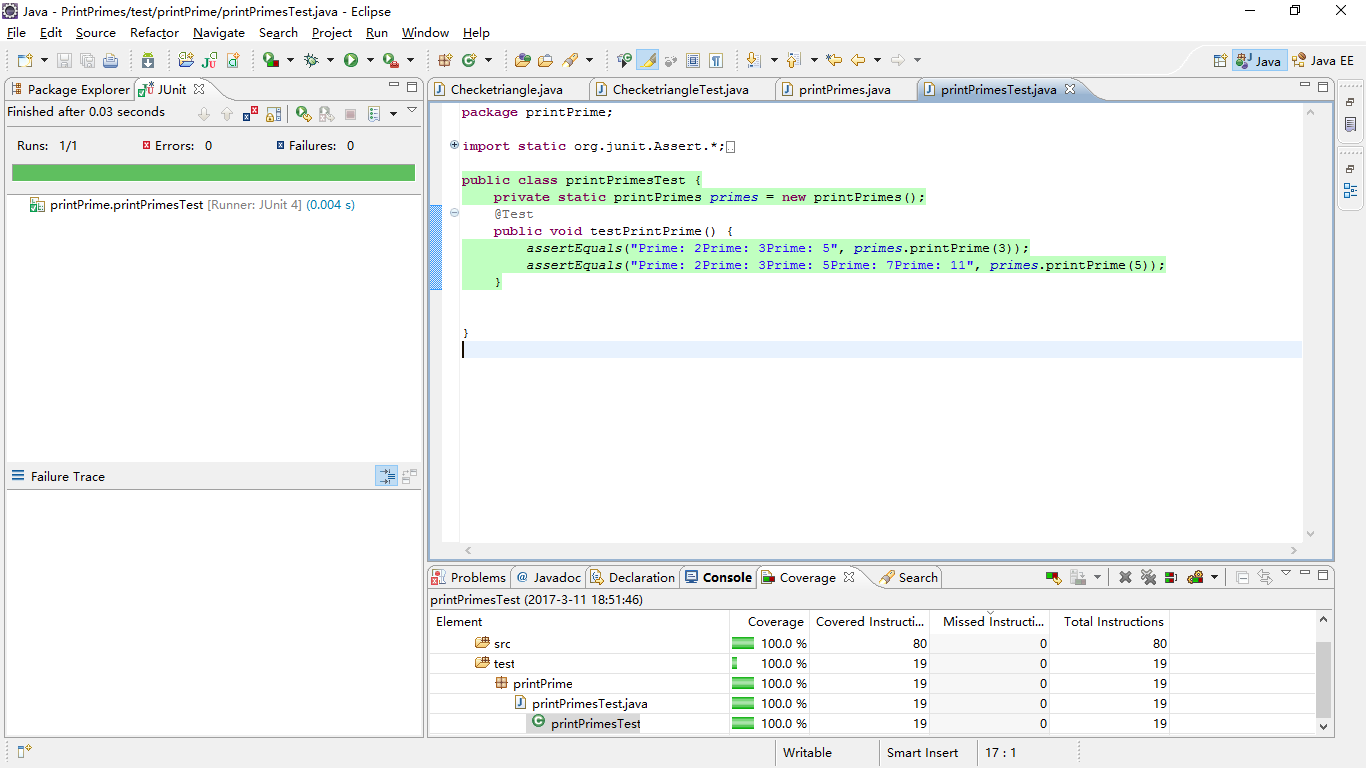题目
/******************************************************* * Finds and prints n prime integers * Jeff Offutt, Spring 2003 ******************************************************/ public static void printPrimes (int n) { int curPrime; // Value currently considered for primeness int numPrimes; // Number of primes found so far. boolean isPrime; // Is curPrime prime? int [] primes = new int [MAXPRIMES]; // The list of prime numbers. // Initialize 2 into the list of primes. primes [0] = 2; numPrimes = 1; curPrime = 2; while (numPrimes < n) { curPrime++; // next number to consider ... isPrime = true; for (int i = 0; i <= numPrimes-1; i++) { // for each previous prime. if (isDivisible(primes[i], curPrime)) { // Found a divisor, curPrime is not prime. isPrime = false; break; // out of loop through primes. } } if (isPrime) { // save it! primes[numPrimes] = curPrime; numPrimes++; } } // End while // Print all the primes out. for (int i = 0; i <= numPrimes-1; i++) { System.out.println ("Prime: " + primes[i]); } } // end printPrimes
(a)、画出控制流程图
(b)、MAXPRIMES=4,这样t1=(n=3)不会发生越界错误,但是t2=(n=5) 会发生越界错误。
(c)、当n==1时,不满足进入while的条件。
(d)、
Node coverage:TR={1,2,3,4,5,6,7,8,9,10,11,12,13,14,15,16}
Edge coverage:
TR={(1,2),(2,3),(2,4),(4,5),(5,6), (5,7), (6,9),(9,6),(6,8),(8,10),(7,10),
(10,11),(10,12),(11,5), (12,5),(3,13),(13,14),(14,15),(15,14),(13,16)}
Prime path coverage:
TR={(1,2,4,5,7,10,12),(1,2,4,5,6,9,6),(1,2,4,5,7,10,11),(1,2,4,5,6,8,10,12),
(1,2,4,5,6,8,10,11)(1,2,3,13,16),(1,2,3,13,14,15),
( 2,4,5,7,10,12,2,3,13,16), ( 2,4,5,7,10,12, 2,3,13,14,15),
(2,4,5,7,10,11,2, 3,13,16), (2,4,5,7,10,11, 2,3,13,14,15),
(2,4,5,6,8,10,12,2, 3,13,16), (2,4,5,6,8,10,12,2, 3,13,14,15)
(2,4,5,6,8,10,11,2, 3,13,16), (2,4,5,6,8,10,11,2, 3,13,14,15)
(6,8,10,11,2,3,13,16), (6,8,10,11,2,3, 13,14,15),
(6,8,10,12,2,3,13,16), (6,8,10,12,2,3, 13,14,15),
(13,14,15,13),(14,15,13,16),(5,6,9,6)
主路线覆盖的测试:
测试之前需要修改一下之前的代码,修改为以下:
public String printPrime (int n) { int curPrime; // Value currently considered for primeness int numPrimes; // Number of primes found so far. boolean isPrime; // Is curPrime prime? int [] primes = new int [MAXPRIMES]; // The list of prime numbers. String str = ""; // Initialize 2 into the list of primes. primes [0] = 2; numPrimes = 1; curPrime = 2; while (numPrimes < n) { curPrime++; // next number to consider ... isPrime = true; for (int i = 0; i <= numPrimes-1; i++) { // for each previous prime. if (isDivisible(primes[i], curPrime)) { // Found a divisor, curPrime is not prime. isPrime = false; break; // out of loop through primes. } } if (isPrime) { // save it! primes[numPrimes] = curPrime; numPrimes++; } } // End while // Print all the primes out. for (int i = 0; i <= numPrimes-1; i++) { str+="Prime: " + primes[i]; } return str; }
测试部分代码:
package printPrime; import static org.junit.Assert.*; import org.junit.Test; public class printPrimesTest { private static printPrimes primes = new printPrimes(); @Test public void testPrintPrime() { assertEquals("Prime: 2Prime: 3Prime: 5", primes.printPrime(3)); assertEquals("Prime: 2Prime: 3Prime: 5Prime: 7Prime: 11", primes.printPrime(5)); } }
测试结果如下,可以看出已经全部覆盖:
